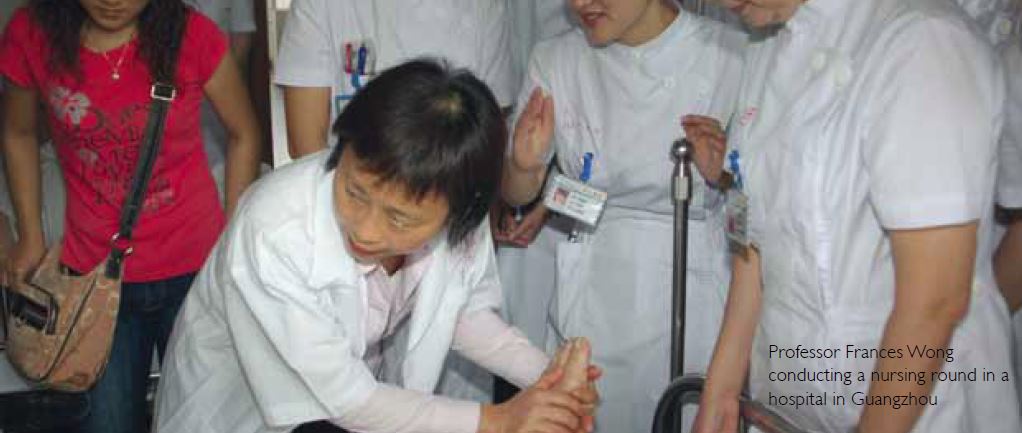© Hong Kong Academy of Medicine. CC BY-NC-ND 4.0
HEALTHCARE FOR SOCIETY
Pioneer of nursing reforms: an interview with Professor
Frances Wong
Venice Li, Hilary Kwok, Joey Chan
Year 6 (MB ChB), The Chinese University of Hong
Kong
Professor Frances Kam-yuet Wong’s warm smile and
friendliness were what first caught our attention. Bringing along some
cinnamon tea she bought from the United States, she openly
offered to make us tea, as she guided us through her life story of working
beyond the call of her duty as a nursing profession. Charged with a
passion to serve the community Prof Wong, President of the Hong Kong
Academy of Nursing (HKAN), described her determination to embark on a
journey to lobby for better patient care through advocating for policy
changes and leading spear-headed changes to introduce multidisciplinary
care into the Hong Kong community. Hers is a story that echoes her belief
that the whole is greater than the sum of its parts.
Humble beginnings
The humanitarian aspect of medical care touched her
heart. After graduation and assuming the role of a registered nurse, Prof
Wong had a renewed sense to directly touch the lives of others. This
motivated her to spend her weekends visiting refugee camps in Kowloon
City. By helping in the clinics, she was able to provide valuable help
that these clinics depended on by assisting in essential procedures that
were in heavy demand. With a motivation to lend a helping hand wherever it
was welcomed, she also regularly visited children with intellectual
disabilities. Prof Wong recounts a particularly memorable time during her
time as a young nurse when she was able to share a unique and deep bond
with her long-term patients in the intensive care and renal wards. With
in-depth conversations made with every decision, a naturally close rapport
was built between them. She was deeply touched when she was invited to the
funerals of her dear patients.
Positive impact on Hong Kong’s nursing profession
Unlike their medical counterparts, nursing
specialists in Hong Kong previously did not have any registries or
accreditation systems. That began to change in October 2011, when HKAN was
established, with the aim to strive for regulation of advanced nursing
practice and to accredit nurse specialists on par with international
standards. Prof Wong played a pivotal role in the establishment of the
HKAN, and her mission now is to achieve statutory status and gain legal
protection for nurse specialists in Hong Kong so that the public is
protected by safe professional practice. Prof Wong’s diverse background
and extensive clinical experience guide her to lead the fight for the
rights of nurses. Prof Wong is a key player in HKAN’s efforts to regulate
advanced nursing practice. In large part as a result of her efforts,
numerous nurses in mainland China have received an internationally
recognised accreditation status, and it is hoped that this system can
achieve statutory status in Hong Kong. This system would provide legal
protection for specialist nurses and enhance healthcare services provided
to the community by ensuring that safe, professional nursing care is
provided to all patients. Not only does Prof Wong approach her daily work
with an incredible amount of passion, she has also always taken the
initiative to go the extra mile for example by working with the
underprivileged on her days off during her time as a practising nurse, and
more recently through lobbying and advocacy for policy changes that will
improve patient care. Prof Wong serves as an exemplary model of how
healthcare professionals should approach their work.
Community-based interdisciplinary healthcare support
“Hong Kong has medical services but not healthcare
services.” These words from an American professor gave Prof Wong pause for
thought. During her research in transitional care from hospital to
community, Prof Wong realised that the inadequacy of post-discharge
community healthcare leads to high readmission rates and increases the
burden of Hong Kong’s healthcare system. This led her to the idea of
community-based health centres, which consist of interdisciplinary
healthcare professionals such as nurses, physiotherapists, occupational
therapists, and counsellors. Together, the team help to solve underlying
social problems that contribute to health problems, so that the public can
receive community-based support. The government-funded pioneer district
health centre will be established in Kwai Tsing district, with hopes to
enhance the public’s awareness of disease prevention and to provide
support for the chronically ill. As a member of the Steering Committees on
Primary Healthcare Development and Prevention and Control of
Non-communicable Diseases, Prof Wong envisions the progressive
participation of other districts and the involvement of the whole Hong
Kong population. She hopes that ultimately, more and more citizens will
take an active role to manage their own health instead of solely relying
on healthcare professionals.
Inspiration and drive
Prof Wong describes nursing as a calling, saying,
“I did not choose nursing, but nursing chose me”. Since the early days of
her career, when she decided to pursue nursing instead of a Sociology
degree, Prof Wong has always found the job to be incredibly rewarding. She
feels privileged to be trusted by patients and is grateful for the
opportunity to accompany them on their journeys. This immense job
satisfaction drives Prof Wong to further her career as a nurse, and also
to advance the profession as a whole. Along the way, she has met many
inspirational figures, whose passion for the profession and for the care
of patients she greatly admires. They include professors who taught her in
nursing school and numerous members of the HKAN.
Parting words
To draw our interview to a conclusion, Prof Wong
offered a few words of advice for both healthcare providers and the
public. To healthcare professionals, she says, “Follow your passions, as
this will be better for both yourself and your patients.” In general
terms, she also advises everyone to, “Take more responsibility for your
own health, and remember to practice self-care.”

Figure 2. Professor Frances Wong (second from left) was interviewed by the journal’s student reporters (from left): Joey, Venice and Hilary


